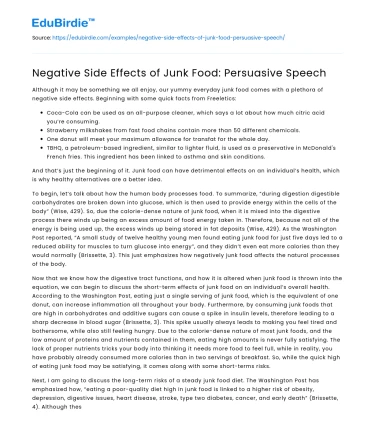Although it may be something we all enjoy, our yummy everyday junk food comes with a plethora of negative side effects. Beginning with some quick facts from Freeletics:
- Coca-Cola can be used as an all-purpose cleaner, which says a lot about how much citric acid you’re consuming.
- Strawberry milkshakes from fast food chains contain more than 50 different chemicals.
- One donut will meet your maximum allowance for transfat for the whole day.
- TBHQ, a petroleum-based ingredient, similar to lighter fluid, is used as a preservative in McDonald's French fries. This ingredient has been linked to asthma and skin conditions.
And that’s just the beginning of it. Junk food can have detrimental effects on an individual’s health, which is why healthy alternatives are a better idea.
To begin, let’s talk about how the human body processes food. To summarize, “during digestion digestible carbohydrates are broken down into glucose, which is then used to provide energy within the cells of the body” (Wise, 429). So, due the calorie-dense nature of junk food, when it is mixed into the digestive process there winds up being an excess amount of food energy taken in. Therefore, because not all of the energy is being used up, the excess winds up being stored in fat deposits (Wise, 429). As the Washington Post reported, “A small study of twelve healthy young men found eating junk food for just five days led to a reduced ability for muscles to turn glucose into energy”, and they didn’t even eat more calories than they would normally (Brissette, 3). This just emphasizes how negatively junk food affects the natural processes of the body.
Now that we know how the digestive tract functions, and how it is altered when junk food is thrown into the equation, we can begin to discuss the short-term effects of junk food on an individual’s overall health. According to the Washington Post, eating just a single serving of junk food, which is the equivalent of one donut, can increase inflammation all throughout your body. Furthermore, by consuming junk foods that are high in carbohydrates and additive sugars can cause a spike in insulin levels, therefore leading to a sharp decrease in blood sugar (Brissette, 3). This spike usually always leads to making you feel tired and bothersome, while also still feeling hungry. Due to the calorie-dense nature of most junk foods, and the low amount of proteins and nutrients contained in them, eating high amounts is never fully satisfying. The lack of proper nutrients tricks your body into thinking it needs more food to feel full, while in reality, you have probably already consumed more calories than in two servings of breakfast. So, while the quick high of eating junk food may be satisfying, it comes along with some short-terms risks.
Next, I am going to discuss the long-term risks of a steady junk food diet. The Washington Post has emphasized how, “eating a poor-quality diet high in junk food is linked to a higher risk of obesity, depression, digestive issues, heart disease, stroke, type two diabetes, cancer, and early death” (Brissette, 4). Although these may sound extreme, they are very serious conditions that do occur when individuals fail to monitor the foods that they consume. A review of recent studies of fast food and overall health have found that consuming fast food more than once a week has a direct correlation to a higher risk of obesity, while eating junk food more than twice a week is associated with type two diabetes and coronary heart disease (Brissette, 4). These facts are extremely alarming to think about, because the average American eats a fast food meal at least once a week. To add more information to the risks junk food poses, an Australian study executed by the Washington Post suggests that for people with asthma, any fast food meal that contains high amounts of saturated fats can increase inflammation directly in the airways, therefore increasing the probability of an asthma attack.
As you can hopefully see, the short-lived joy of consistently eating junk food isn’t necessarily worth the many risks that come along with it. So, in order to help prevent these detrimental effects, there is a plethora of cheap and healthy alternatives out there. A few examples of some cheap and healthy swaps include: popcorn instead of chips, margarine instead of butter, smoothies instead of milkshakes, bunless burgers instead of traditional burgers, and plenty more. As the Medical News Today emphasized, the additional benefits from eating healthier alternatives include weight loss, reduced cancer risk, diabetes management, heart health and stroke prevention, strong bones and teeth, better mood, improved memory, improved gut health, and a good night's sleep (Crichton-Stuart). All of these positive effects most definitely outweigh the plethora of negatives that come along with eating junk food.
To conclude, it is blatantly obvious that junk food is not the best option when it comes to maintaining one’s overall health. Junk food is associated with a plethora of negative side effects, both short-term and long-term, while healthier options reap benefits. So, just keep in mind that when deciding between a healthy meal or a junky meal, just a single healthy meal a day could reduce overall stress and inflammation in your body. With every meal, you have the opportunity to positively impact your overall health and well-being.
Works Cited
- Brissette, Christy. “This Is Your Body on Fast Food”. The Washington Post. 1 March, 2018. pp. 3 — 5.
- Crichton-Stuart, Cathleen. “Medical News Today”. 26 June, 2018.
- Seana. “6 Shocking Facts about Junk Food”. Intensive Workouts and Individual Training.
- Plans. 1 January, 2014. https://www.freeletics.com/en/blog/posts/6-shocking-facts-junk-food/
- Wise, James, et al. “16.2 Digestive System”. Concepts of Biology. 12th Media Services, 2017. pp. 427 - 434.






 Stuck on your essay?
Stuck on your essay?

